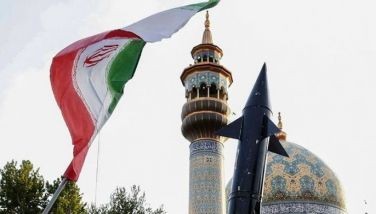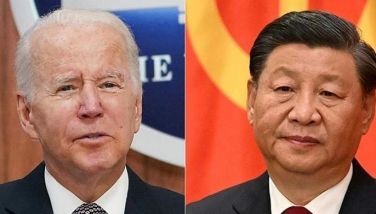Malaysian leader silences critics, media to survive scandal
KUALA LUMPUR, Malaysia — Malaysia's prime minister has a problem: He can't explain away a $700 million bank account to a skeptical public.
His response? A crackdown on critics and the press that has kept him in power but doesn't address a deep reservoir of dissatisfaction with his leadership.
Less than a month after leaked documents suggested that $700 million from entities linked to debt-ridden state investment fund 1MDB was funneled into Prime Minister Najib Razak's accounts, he has expelled critics in his government, sacked the attorney-general probing him, suspended two newspapers, blocked a UK-based website and stalled investigations over the scandal.
It is the first time a Malaysian leader has faced criminal allegations, and news of possible graft at the top level has gripped the country. It is also the biggest political crisis for Najib since he took power in 2009. Concerns over 1MDB also contributed to the Malaysian currency plunging to a 17-year low beyond 4 ringgit to the dollar on Wednesday.
"Malaysia's leader is still facing a legitimacy crisis with declining domestic support," said Bridget Welsh, senior research associate at the Center for East Asia Democratic Studies at the National Taiwan University.
The message being sent is that Najib's leadership is moving further toward a hardline trajectory, she said. "History shows that crackdowns, arrests and threats backfire, and are at best temporary measures that fail to address the underlying demands for a better Malaysia."
A nation of 30 million, Malaysia is predominantly Malay Muslim with significant Chinese and Indian minorities. It is a U.S. ally in Southeast Asia and one of the region's lynchpin economies, with ambitions to rise from middle income status to developed nation level this decade. Najib's increasing authoritarianism is a setback for the hopes of many Malaysians that their country was slowly embracing elements of liberal democracy.
In a new twist last week, the anti-graft agency said the money was donations from the Middle East, and unrelated to 1MDB. Najib, who insists he has never used government funds for personal gain, then said he received the money on behalf of his ruling Malay party, with much of it going toward "social responsibility" programs.
While the explanation has seemingly cleared Najib of corruption claims, it didn't mollify critics nor improve his public image. On the contrary, it raised new questions over who in the Middle East would donate such a huge sum and whether it came with conditions. It also didn't answer the mystery over why it landed in Najib's accounts.
Electoral reform group, Bersih, is planning mass rallies at the end of August, on the weekend of Malaysia's Independence Day, to demand Najib's resignation but police have warned of a crackdown. Najib has also indicated he may crack the whip further, saying recently that laws regulating Internet content need to be tightened to prevent "trial by the social media" against the government.
The scandal started with investigations into 1MDB, which was set up in 2009 by Najib to develop new industries. But in just six years, it amassed 42 billion ($10.6 billion) in debt after its energy ventures abroad faltered. Critics have long voiced concern over its massive debt and lack of transparency. Najib still chairs its advisory board.
Police, meanwhile, have gone on a witch-hunt to determine who leaked the documents showing transfers to Najib's accounts. Police have questioned nine members of the anti-graft agency, seven central bank officials and have said they may also question central bank governor Zeti Akhtar Aziz.
Despite the crisis, Najib has strengthened his footing in his United Malays National Organization, or UMNO, and taken full control of the government by placing loyalists in key positions. UMNO is the linchpin of the National Front coalition that has ruled Malaysia since independence from Britain in 1957.
Support for the National Front has eroded in the last two general elections. In 2013, it won the polls but lost the popular vote for the first time to the opposition alliance led by Anwar Ibrahim, who is now in prison after being convicted of sodomizing an aide in a case widely regarded as politically motivated.
UMNO is entrenched as the defender of majority ethnic Malays, protecting their rights through decades-old affirmative action policies favoring Malays in jobs, education and government contracts — and this is hard to dislodge, analysts said.
"This party has captured the state institutions and machinery and that's why they can control everything," said James Chin, who heads the Asia Institute in Australia's University of Tasmania.
"In Malay political culture, a strong leader is feared and admired, and that's how Najib is selling himself, as a strongman," Chin said.
The 62-year-old Najib, whose father and uncle were the country's second and third prime ministers respectively, was educated in Britain. He returned to work for the central bank and the national oil company but was unexpectedly thrust into politics when his father, then-Prime Minister Abdul Razak Hussein, died in 1976.
At age 22, he was Malaysia's youngest lawmaker ever at the time and patiently worked his way to the top. He speaks impeccable English and seen as modern: he has his own blog and is an avid social media user.
Since becoming premier, Najib has battled criticism over his management of the economy, his family's lavish lifestyle and association with the killers of a Mongolian model nine years ago. Najib has said he had nothing to do with the model. Two security officers linked to Najib at the time were found guilty of her murder.
One of his most vocal critics is former Prime Minister Mahathir Mohamad, who stepped down in 2003 after 22 years in power. Mahathir has called for Najib to resign over the 1MDB affair, warning there was "something rotten" in the government.
Najib's own brother, Nazir Razak, who heads Malaysia's second largest banking group CIMB, has also echoed concerns over the country's future. In an Instagram post last month, Nazir said "in this darkest hour of political times, we must remember to place the country and the (people) first. Not personal interests, not personal loyalties, not even party politics."
Ibrahim Suffian, who heads the Merdeka Center for Opinion Research, said UMNO and other National Front parties have rallied behind Najib because they fear the 1MDB crisis could sink the government.
The controversy over 1MDB came at a time of economic slowdown as falling commodity prices hurt Malaysia's export-driven economy and government revenue. The public is also grappling with higher cost of living due to a new goods and services tax imposed in April.
Chin from the University of Tasmania said Najib is more focused on consolidating power, than fixing the economy.
"Najib has the upper hand now but if the economy sours further, it could spell trouble for him."
- Latest
- Trending
































